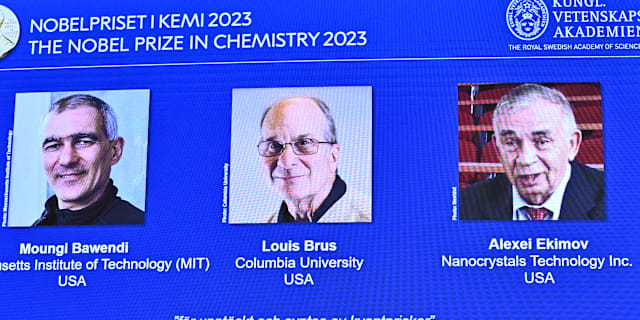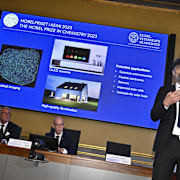
This year's Nobel Prize will be awarded in 2023 to Moungi G. Bawendi, Massachusetts Institute of Technology (MIT), Cambridge USA, Louis E. Brus, Columbia University, New York USA and Alexei I. Ekimov, Nanocrystals Technology Inc., New York USA, f Claudio Bresciani / TT / TT News Agency
The Nobel Prize
The awardee "didn't know about the leak - is shocked"
Nobel laureate Moungi G Bawendi, who is associated with the University MIT in Boston, USA, comments on his award saying that he is "tired, shocked and very honored".
When asked if the Royal Academy of Sciences accidentally leaked the news several hours in advance, he replies:
- I knew nothing about that. I found out in connection with the Nobel Committee calling and giving me the news.
In Boston, it was about one in the morning when word of the Nobel committee's mistake became known.
Bawendi receives the award together with Louis Brus and Aleksej Ekimov for their respective discoveries regarding nanotechnology.
The Royal Swedish Academy of Sciences writes that the trio each individually and through various experiments paved the way for nanotechnology's smallest components, quantum dots, to now be used to, for example, illuminate computer and television screens and refine the light in LED lamps.
Nobel week
Monday: Nobel Prize in Physiology or Medicine
Tuesday: The Nobel Prize in Physics
Wednesday: The Nobel Prize in Chemistry
Thursday: The Nobel Prize in Literature
Friday: Nobel Peace Prize

Illustration picture Henrik Montgomery/TT / TT Nyhetsbyrån
"A fad that goes down in history - embarrassing"
That the Royal Swedish Academy of Sciences accidentally revealed this year's Nobel laureate in chemistry too early is "embarrassing", observes Maria Gunther in a column in Dagens Nyheter.
The Nobel Committee's Heiner Linke described what happened as "very unfortunate". Gunther agrees, but doesn't think the prize's reputation is threatened:
"But for us science journalists, and perhaps even for preconceived scientists, some of the excitement, anticipation and mystery disappeared today."
Science journalist Ulrika Björkstén, who has followed the announcements of the Nobel Prize for 30 years, tells TV4 Nyheterna that she has never seen "something like this".
- It is a fad that will go down in history, you can say that, she says.
Dagens Media's Leif Holmkvist reacts to the fact that the media "blacked out" the names of the named award winners for a long time: Moungi G Bawendi Louis E Brus and Aleksej I Ekimov and raises the question of whether this strengthens the image of a "complaint" consisting of journalists and researchers and makes a connection to the pandemic.

STOCKHOLM Heiner Linke, Nobel Committee for Chemistry, presents the winners' discoveries. Claudio Bresciani / TT / TT News Agency
Discovered how tiny particles can light up screens
This year's chemistry prize winners Moungi G Bawendi, Louis Brus and Aleksej Ekimov receive the prize for their discoveries around nanotechnology.
The Royal Swedish Academy of Sciences writes in a press release that the three prize winners, through various experiments, paved the way for nanotechnology's smallest components, quantum dots, to now be used to, for example, illuminate computer and television screens and refine the light in LED lamps.
TT notes that Alexei Ekimov started it all in the early 1980s by creating size-dependent quantum effects in colored glass, so he could show that the size of the particles affected the color of the glass via so-called quantum effects.
Louis Brus was later able to show size-dependent quantum effects in particles floating freely in liquid before Moungi Bawendi in turn made quantum dots practically useful when in 1993 he "revolutionized" chemical manufacturing and managed to produce quantum dots of almost perfect quality.
Inga kommentarer:
Skicka en kommentar